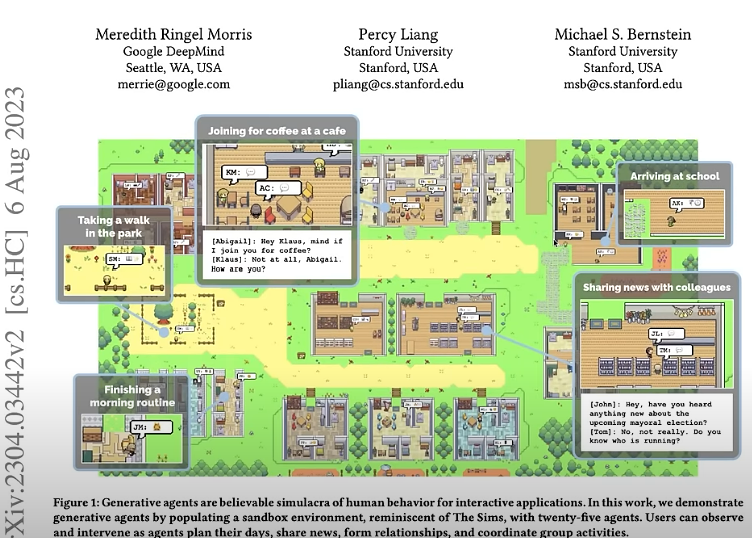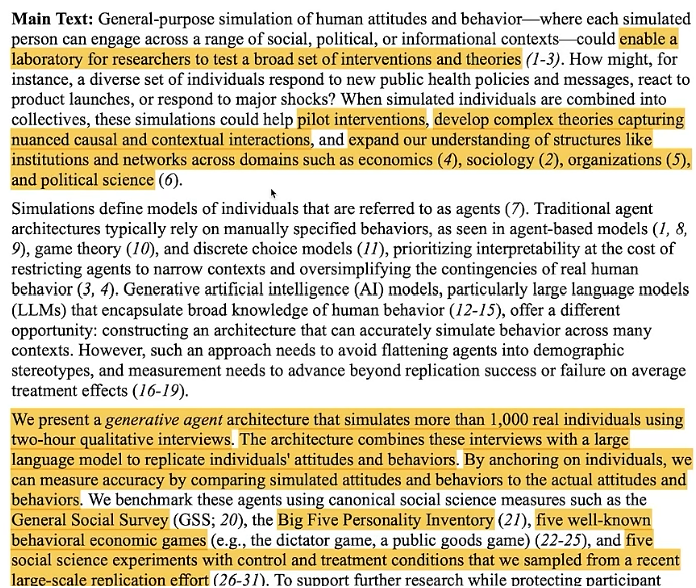Envision a world where AI agents can replicate human personalities with stunning accuracy, allowing them to live, interact, and develop relationships just like real people. This fascinating possibility is becoming a reality, thanks to groundbreaking research that combines AI technology with social science methods. This blog post delves into the remarkable advancements in AI agents, exploring their potential to transform simulations, video games, and our understanding of human behaviour.
The Birth of AI Agents
Last year, a paper from Stanford University introduced the concept of generative agents in a simulated environment. Thousands of AI agents were placed in this environment, where they formed relationships, built memories, and developed distinct personalities. This initial research opened the door to envisioning future video games where non-playable characters (NPCs) possess genuine personalities and backstories, living their lives in real-time.

A New Leap in AI Research
Building on this foundation, a new paper by the same lead author, Junsung Park, has taken the concept further. This research focuses on the ability to clone and inject real human personalities into AI agents. The paper, titled “Generative Agent Simulations of 1,000 People,” showcases how researchers conducted extensive interviews with individuals to extract their personality traits and behaviours before placing them into a simulated environment.
Understanding the Process
The study involved in-depth, two-hour interviews with 1,000 individuals, aiming to capture the essence of their personalities. By using well-established social science tests, including the General Social Survey and the Big Five personality inventory, researchers were able to quantify and replicate the attitudes and behaviours of these individuals in AI agents.
The innovative architecture of these generative agents combines interview data with large language models, allowing the agents to mimic the thoughts and behaviours of their human counterparts. The findings were astounding: the agents demonstrated an average accuracy of 85% in replicating human responses, showcasing their ability to behave similarly to real people.

Practical Applications and Far-reaching Impacts
But why is this research significant? The potential applications of these AI agents are vast. They could be used to simulate complex social interactions, helping researchers understand how people might respond to various stimuli, such as policy changes or social trends, without implementing real-world trials.
Imagine wanting to test a new tax plan. Instead of rolling it out and waiting to see the outcome, researchers could create a simulated society of AI agents—each reflecting real human personalities—and observe how they react to the proposed changes. This predictive power could revolutionise fields such as economics, sociology, and political science.
The implications for the gaming industry are equally exciting. Games could feature NPCs that not only have unique backstories but also react and develop relationships with players in a realistic manner. This advancement could lead to richer, more immersive gaming experiences where every interaction feels meaningful.
Challenges Ahead
However, the journey isn’t without its challenges. One major concern is bias in artificial intelligence. If the training data for these agents is limited or skewed, it can lead to misrepresentation of certain demographics. The research found that interview-based agents consistently reduced biases compared to demographic-based agents, suggesting that more nuanced data collection methods could lead to fairer AI representations.
Final Thoughts: Embracing the Dawn of AI Agents
As we look forward, the integration of AI agents into various fields could reshape our understanding of human interactions and society as a whole. The ability to simulate real human behaviour opens up exciting possibilities for testing theories, understanding social dynamics, and even enhancing customer service experiences in businesses.
The research into AI agents that can replicate human personalities marks a significant milestone in the field of artificial intelligence. As these technologies continue to evolve, the potential for creating more realistic simulations and understanding human behaviour grows exponentially. The future of AI is bright, and with ongoing advancements, we can expect to see profound changes in how we interact with technology and each other.
If you’re intrigued by the possibilities of AI and want to dive deeper into this fascinating subject, consider getting in touch with Malgamate for one-on-one and DFY (Done for You) AI agent solutions. Together, we can explore the cutting edge of technology and its implications for our world.
The interview process used in this research was particularly noteworthy. By employing semi-structured interviews that allowed for dynamic follow-up questions, researchers were able to gather rich, qualitative data that better captured individual personalities. This approach contrasts sharply with traditional survey methods, which often fail to account for the complexities of human behaviour. Here is the paper: https://arxiv.org/abs/2411.10109


